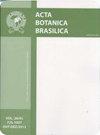Do phytoplankton and epiphyton communities differ between organic and conventional rice fields?
IF 1.1
4区 生物学
Q4 PLANT SCIENCES
引用次数: 0
Abstract
This study aimed to determine if there are any differences in the attributes and composition of the phytoplankton and epiphyton communities between organic (OF) and conventional (CF) rice fields. We also strove to identify if there were any variations in these communities by comparing samples taken from two different periods (12 and 35 days) after the application of the herbicide clomazone and penoxsulam in CF. The farms are located in the Pampa Biome, Southern Brazil. Phytoplankton samples from the subsurface water and epiphyton samples from the rice stems were analyzed using the Utermöhl method. The CF and OF had distinct environmental conditions (pH, conductivity, and turbidity values), and the residual concentration of the herbicides decreased over time. There were no significant differences in epiphyton and phytoplankton density, or in phytoplankton richness, between the rice fields; only the epiphyton richness and taxonomic composition showed differences between the rice fields. Cyanobacteria and Chlorophyceae comprised a large proportion of the epiphytic density in CF and OF, respectively. However, Bacillariophyceae and Chlorophyceae had greater phytoplankton densities in CF and OF, respectively. The taxonomic composition of communities should be considered an effective tool to show the differences between the two cultivation systems.有机稻田和常规稻田的浮游植物和附生植物群落是否不同?
本研究旨在确定有机稻田(of)与常规稻田(CF)浮游植物和附生植物群落的属性和组成是否存在差异。我们还通过比较在CF中使用除草剂氯马酮和培诺舒拉姆后两个不同时期(12天和35天)采集的样本,努力确定这些群落中是否存在任何变化。这些农场位于巴西南部的潘帕生物群。利用Utermöhl方法对地下水浮游植物和水稻茎部附生植物样品进行分析。CF和OF具有不同的环境条件(pH、电导率和浊度值),除草剂残留浓度随时间的推移而降低。稻田间浮游植物密度和浮游植物丰富度无显著差异;稻田间仅在附生植物丰富度和分类组成上存在差异。藻蓝藻和绿藻分别占CF和of附生密度的较大比例。藻门和绿藻门浮游植物密度分别在CF和OF中较高。群落的分类组成应被视为显示两种耕作制度差异的有效工具。
本文章由计算机程序翻译,如有差异,请以英文原文为准。
求助全文
约1分钟内获得全文
求助全文
来源期刊

Acta Botanica Brasilica
PLANT SCIENCES-
CiteScore
2.30
自引率
9.10%
发文量
32
审稿时长
6-12 weeks
期刊介绍:
Experimental, theoretical and applied papers on all aspects of plant (including algae) and fungi biology are welcome. The submitted manuscript or its essential content must not have been published previously or be under consideration for publication elsewhere. Contributions should be substantial, written in high-quality English and show general interest. We expect that the submitted manuscript presents a great novelty in Botany, and this should attract a wide audience. Considering this, case studies are only considered if the narrative and implications are provided to be of general interest. Thus, manuscripts that report aspects of local interest are discouraged unless the implications of the findings are wide-reaching. Manuscripts with agronomic subjects are expected to contain a substantial amount of basic plant biology. Please see below some details for specific area.
 求助内容:
求助内容: 应助结果提醒方式:
应助结果提醒方式:


